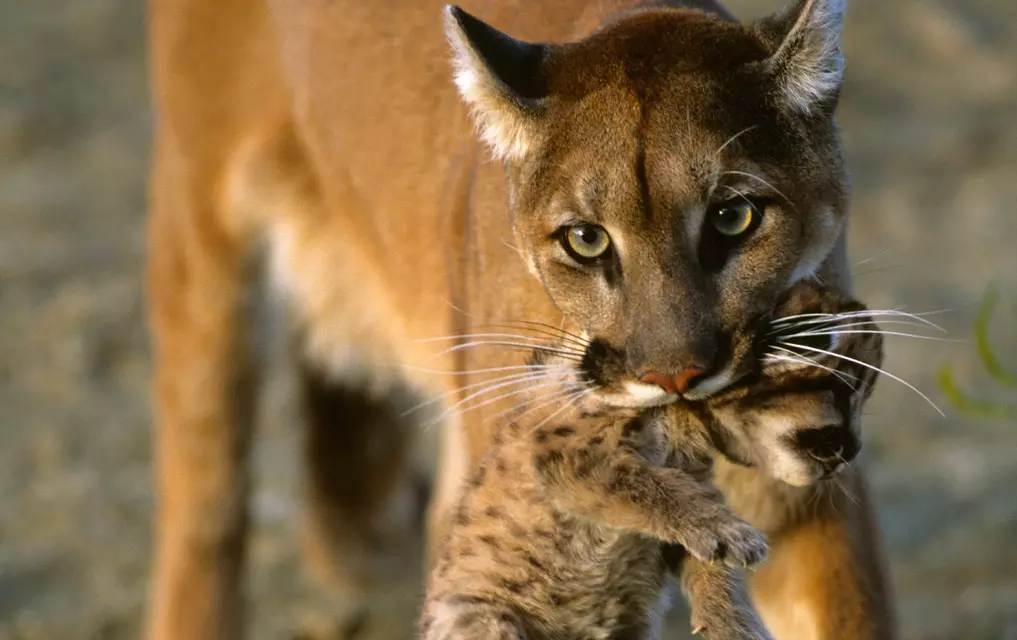Measure designed to stop the use of packs of dogs and traps to kill mountain lions, bobcats, and lynx for their heads and their fur. Measure allows lethal control of any nuisance cats when warranted
Colorado — Volunteers with Cats Aren’t Trophies, a statewide political committee and coalition seeking to qualify and pass an initiative petition to protect wild cats in Colorado from ruthless killing of these animals for their heads and their fur, today delivered 188,000 signatures of Colorado voters to the Secretary of State. The state requires 124,238 valid signatures of registered voters to secure ballot placement for November 2024.
“Today we submit signatures to give Colorado voters an opportunity to stop the inhumane, unsporting killing of mountain lions and bobcats for their heads and their beautiful coats,” said Samantha Miller, Cats Aren’t Trophies campaign manager, a member of Backcountry Horsemen, and a resident of Grand County. “This is commercial killing, with lion-hunting guides charging an $8,000 fee to guarantee a ‘trophy’ and trappers selling bobcat pelts to China.”

The measure has already attracted support from nearly 100 animal welfare and wildlife conservation organizations, and it is backed by hunters and humane societies, veterinarians and veterans, and all manner of Coloradans from mountain, suburban, and rural reaches of the state. There were 900 volunteers who gathered nearly two-thirds of the 188,000 signatures gathered today — almost unprecedented in the era of paid-signature collecting.
“When I worked for the Division of Wildlife a generation ago, I was heartened that Colorado voters banned inhumane and unsporting baiting, hounding, and spring bear hunting of black bears and, in a second ballot measure, halted the use of cruel steel-jawed leghold traps,” said Julie Marshall, now the public relations director for Animal Wellness Action and the Center for a Humane Economy and a native Coloradan. “This CATs measure deals with the unfinished business of restricting fringe hunting practices at odds with our understanding of ecology and animal welfare and not done for food or for management.”
The Problem That CATs Remedies
Trophy hunters, including hundreds who hire professional guides using packs of dogs to offer a guaranteed kill, shoot between 500–600 mountain lions during a single hunting season that stretches from the end of November through March. Of the 501 mountain lions killed for trophies and recreation last season alone, as reported by Colorado Parks and Wildlife, nearly half (47%) of those cats were female and not one was reportedly in conflict with humans. The trophy hunters randomly target lions, typically on national forests and other public lands where there are no conflicts.
Mountain lions can mate at any time throughout the year, and offspring stay with their mothers for as long as 18 months. That means that lion kittens are vulnerable to orphaning during the four-month trophy hunting season.
“With trophy hunters shooting males and females on nearly a one-to-one ratio, it guarantees substantial orphaning of dependent kittens and subadults,” said retired Colonel Thomas Pool, DVM, MPH, former chief of the U.S. Army Veterinary Command, and senior veterinarian with Animal Wellness Action. “Because the mother hides her offspring when chased by packs of dogs, there’s no way for a trophy hunter to determine he’s killing a mother with dependent young. Killing the family group is a tragedy that the CATs ballot measure will solve.”
The measure also addresses the needless and inhumane killing of bobcats, with trophy hunters and commercial trappers killing 1,000–2,000 bobcats a year. Canada lynx are protected under state and federal law, but if those restrictions are lifted in the future, the CATS measure would retain protections for them, granting them the same protected status as mountain lions or bobcats. Lynx are also at risk of incidental trapping looking to kill bobcats.
“The idea that trophy hunters go into the wilderness and shoot lions for fun and claim that they are targeting ‘problem’ lions is a fiction,” said Pat Craig, native Coloradan and founder of The Wild Animal Sanctuary in Keenesburg, the state’s premier wildlife sanctuary and a top destination for Coloradans and people throughout the nation. “That’s the equivalent of a crime control plan that involves shooting into a crowd. This ballot measure retains full authority for Colorado Parks and Wildlife and ranchers to take lions posing an actual threat to human safety, cattle or sheep, or other property.”
So far, the top funders of the opposition campaign are various regional chapters of Safari Club International throughout the country. Safari Club consists of hunters who travel to states and nations to slay the world’s most beautiful and often rare animals for their heads. Safari Club has more than 30 “hunting achievement awards” that incentivize killing animals to adorn their dens and private museums with trophies. Its best-known award is the Africa Big Five, where a trophy hunter gets into the pantheon if he kills a lion, a leopard, an elephant, a rhino, and a Cape buffalo, but there is a second award called “Cats of the World” requiring the hunter to slay a mountain lion or puma, African lion, African cheetah, African leopard, and a Canada or Eurasian lynx.
The primary spokesperson for the opposition campaign is the president of the Colorado Trappers and Predator Hunters Association. Safari Club held a raffle to sell off a trophy lion of Colorado as a carnival prize to fund the opposition.
“A Safari Club trophy hunter shot and wounded an African lion right on the edge of Hwange National Park in Zimbabwe, and he earned worldwide condemnation,” said volunteer Kenneth Ramsey of Douglas County and an annual purchaser of hunting and fishing licenses in Colorado. “Even more extreme and ruthless trophy hunting happens right outside Rocky Mountain National Park and across Colorado’s vast public lands. These are our American lions, and they don’t exist just for people to shoot them for bragging rights and for mounting their heads.”
There is also ample evidence to show trophy hunting lions disrupts social relationships between lions and creates a young class of lions less skilled at killing traditional prey. This scrambling of the territorial relationships between lions and the reducing of the average age of lions increases risk for conflict. Without human trophy hunting pressure, lions live longer, and science shows us that older, mature lions are less likely to engage in conflict with humans.
“As a wildlife ecologist, I support the proposed ban on trophy hunting wild cats. Research has demonstrated that the methods used to hunt these animals, such as pursuing them with hounds or capturing them in traps, cause elevated stress and often injury. Hunting females inevitably leads to orphaned kittens, who rarely survive,”said Mickey Pardo, a biologist specializing in applied wildlife ecology who lives in Fort Collins.
California has banned trophy hunting of lions for more than 50 years and the population is stable, with California having even more lion habitat than Colorado. Last year, there were just 10 lions killed in nuisance complaints, with a population estimate of 3,800 to 4,400 lions in the state.
Supporters of CATs Also Focus on Hunting Ethics and Ecological Services Lions, Bobcats, and Lynx Provide Colorado
“Colorado has long known that mountain lions are key to reducing the incidence of Chronic Wasting Disease, an always fatal brain-wasting disease that is infecting half of Colorado’s deer herds and a third of its elk herds,” said Jim Keen, DVM, Ph.D, a former staff for USDA, director of veterinary sciences for the Center for a Humane Economy, and an infectious disease expert. “The North American lion targets neurologically compromised deer and elk, cleansing the population of disease and protecting these cervid populations for hunters and wildlife watchers alike. In this way, lions are protectors of long-term deer and elk hunting in Colorado.”
“Using dogs to chase a mountain lion to exhaustion and then shooting the cornered animal as it cowers in a tree is a serious violation of fair chase principles. Trapping is likewise a dirty and underhanded method that involves bludgeoning the bobcat to death and selling its fur — often to foreign markets, which is a violation of fair chase and anti-commerce principles under the North American Model of Wildlife Conservation,” says Brett Ochs, who has been hunting elk and deer the majority of his life and believes that mountain lions belong on the natural landscape and should not be hunted for sport.
“I’ve owned and worked my family organic farm with goats and chickens for nearly two decades on hundreds of acres surrounded by National Forest,” says Deanna Meyer of Bell Meadow Farm. “I can protect my animals well with guard dogs and secure nighttime enclosures, and I also value true wildlife conservation and the role of the territorial lion I have been fortunate to see while out on my ATV. I also have elk in my freezer, and allow an elk hunter each year to hunt on my property. But I strongly believe cats are not trophies.”
“When I became a veterinarian, I took an oath to end animal suffering. And when I learned that a bobcat in my community had been trapped and strangled to death, I vowed that this would be the catalyst for change for the humane treatment of bobcats,” said Dr. Christine Capaldo, a veterinarian in southwestern Colorado.
The decision to sport hunt mountain lions of Colorado rests squarely on whether citizens believe it fits their larger moral and societal values, and whether it serves larger environmental goals for future generations,” says Josh Rosenau, Director of Policy & Advocacy with the Mountain Lion Foundation. “If we look at the science, it’s clear that sport hunting mountain lions leads to an imbalance of nature and the environment.”
Important Note to Colorado Journalists: Colorado Parks and Wildlife states the agency is neutral on the CATs initiative and that “it will diligently implement all laws passed by the Legislature and the Governor or by the voters.”

